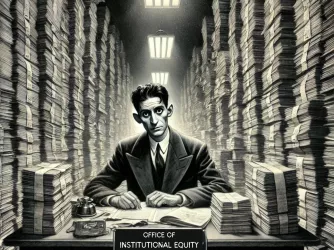Table of Contents
How Can Michigan State University Get Off FIRE’s Red Alert List?
FIRE's full-page ad in U.S. News & World Report's college rankings issue exposes the colleges and universities that are the "worst of the worst" when it comes to individual rights. These are schools where it is downright dangerous for students to express themselves without fear of censorship or punishment, and FIRE warns prospective students and faculty members to think twice before joining these schools.
Brandeis University, Colorado College, Johns Hopkins University, and Tufts University were on last year's list (here is last year's ad), with Bucknell University and Michigan State University this year's dishonorable additions. Last week we explained why Brandeis and Tufts are on FIRE's Red Alert list—and what they can do to get off the list. Earlier this week, we discussed Colorado College's shameful place on the list, and we now turn to Michigan State (MSU).
MSU found student government leader Kara Spencer guilty of "spamming" and misuse of university resources after she criticized the administration's plan to change the school calendar. Spencer had carefully selected and e-mailed 391 faculty members to encourage them to express their views on the proposed changes. Despite the fact that Spencer merely wished to alert a small percentage of the campus community—roughly 8 percent of MSU's faculty—to an important administrative decision, MSU charged her with violation of the university's network use policy and with engaging in an "unauthorized" use of the MSU network. FIRE wrote MSU's president, Lou Anna K. Simon, but Simon falsely claimed that the university's spamming policy was acceptable because it was "content neutral." Spencer was found guilty.
MSU's policy banned sending unsolicited e-mail to more than about 20-30 recipients over two days without prior permission and banned all such e-mails when they were "personal" or "political." FIRE alerted the public, and Spencer appealed. FIRE, the Electronic Frontier Foundation, and a dozen other civil liberties organizations also sent Simon an open letter arguing that MSU's policy was constitutionally suspect on its face, vague, allowed the university unfettered discretion in requiring prior approval, and discriminated on the basis of content.
MSU finally withdrew the charges and began to rewrite its spamming policy. The resulting new policy is actually worse in many respects, however, with a new limit of 10 recipients. Perhaps worst of all, it bans expressing personal opinions in a way that has no hope but to be enforced selectively, completely redefining what virtually every college student is allowed to do with his or her e-mail account:
The University's e-mail services are not intended as a forum for the expression of personal opinions. Other means exist in the University community for the expression and dissemination of personal opinions on matters of interest within the University community. Rather, the University's e-mail services are provided to support the University's instructional, public service, research, and administrative objectives.
MSU is no stranger to violations of students' essential freedoms. Torch readers may recall that in 2007, FIRE was able to bring an end to MSU's Student Accountability in Community (SAC) program, a troubling thought reform program which forced students whose speech or conduct was deemed unacceptable to undergo ideological reeducation or else face effective expulsion. The program is memorable for, among other things, the "Power and Control Wheel" used to identify problematic student behavior.
As is the case with the other schools on FIRE's Red Alert list, MSU can easily get off the list. All it needs to do is redress the infirmities in the new policy. Few, if any, students at public universities in the United States expect their university-provided e-mail accounts to be limited so strictly, and this new policy is a new low for MSU.
Recent Articles
FIRE’s award-winning Newsdesk covers the free speech news you need to stay informed.

UPDATE: Another federal appeals court backs academic free speech for public employees

Feds to Columbia: ‘You want $400 million in contracts back? Do this (or else)’

A picture is worth a thousand words — unless a college district bans it
